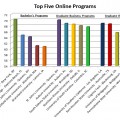 Three bi-partisan bills winding their way through a House Congressional committee seek to make it easier for students and parents to sift through confusing and conflicting information about post-secondary institutions and to ease the burden for students who graduate without the ability to pay back student loans.
Three bi-partisan bills winding their way through a House Congressional committee seek to make it easier for students and parents to sift through confusing and conflicting information about post-secondary institutions and to ease the burden for students who graduate without the ability to pay back student loans.
The bills have been approved by the House Education and the Workforce Committee and are expected to be sent to the full House for votes. At the same time, U.S. Sen. Tom Harkin, D-Iowa, has released a draft proposal for re-authorization of the Higher Education Act. Public comment on the proposal is being accepted through Aug. 29.
Student debt loan stands at about $1.2 trillion, according to the House committee. However, more than 40 percent of students say they cannot recall receiving financial counseling even though it is a requirement prior to approval of a first loan.
The Empowering Students Through Enhanced Financial Counseling Act would ensure that borrowers, both students and parents, receive annual counseling. Additionally, each year borrowers would be advised annually of their debt obligations and sign consent forms prior to receiving federal student loans.
Low-income students who qualify for Pell Grants would be provided counseling for the first time. And the education secretary would have to manage a “consumer-tested” tool to help universities conduct online counseling for Pell grants, annual loans and exit counseling.
The Advancing Competency-Based Education Demonstration Project Act would address the rising costs of post-secondary education and encourage teaching innovations that would lower education costs to the student.
Since 2002 in-state tuitions and fees at public four- and two-year institutions have increased by 51% and 35%, respectively. Costs at private institutions have increased by 25%.
The bill would direct the education secretary to approve and waive existing regulations that block creation of these types of programs. Annual evaluations would be used to measure issues such as program quality and obstacles regarding financial assistance for students.
Colleges and universities would have greater flexibility in offering students cost-efficient and individualized education.
The Strengthening Transparency in Higher Education Act addresses the confusing maze of information the students and parents must sift through in making choices about post-secondary education.
It calls for creation of a consumer-tested College Dashboard program that provides students with such key information about colleges and universities as completion rates of all students.
A link to the dashboard would be listed on a student’s FAFSA (federal aid application). Also, coordination among federal agencies would ensure that all published higher education data is consistent, streamlined and easy to use.





